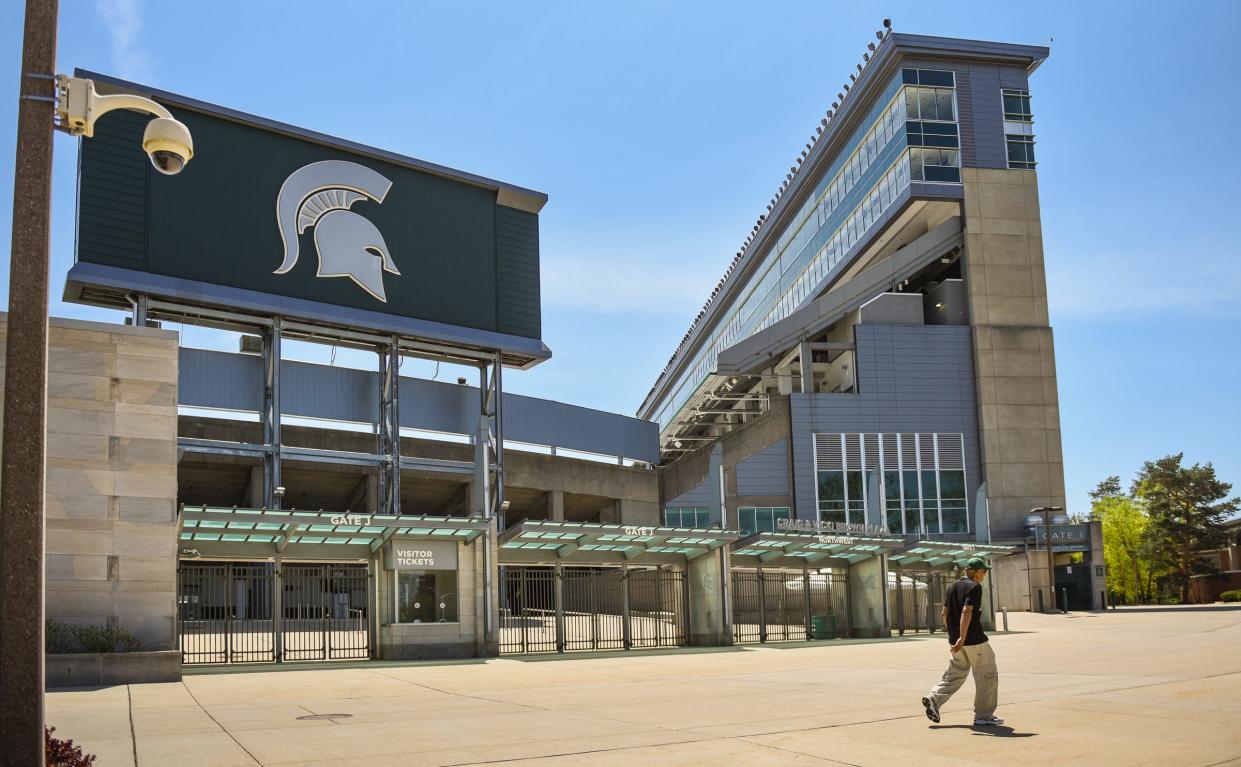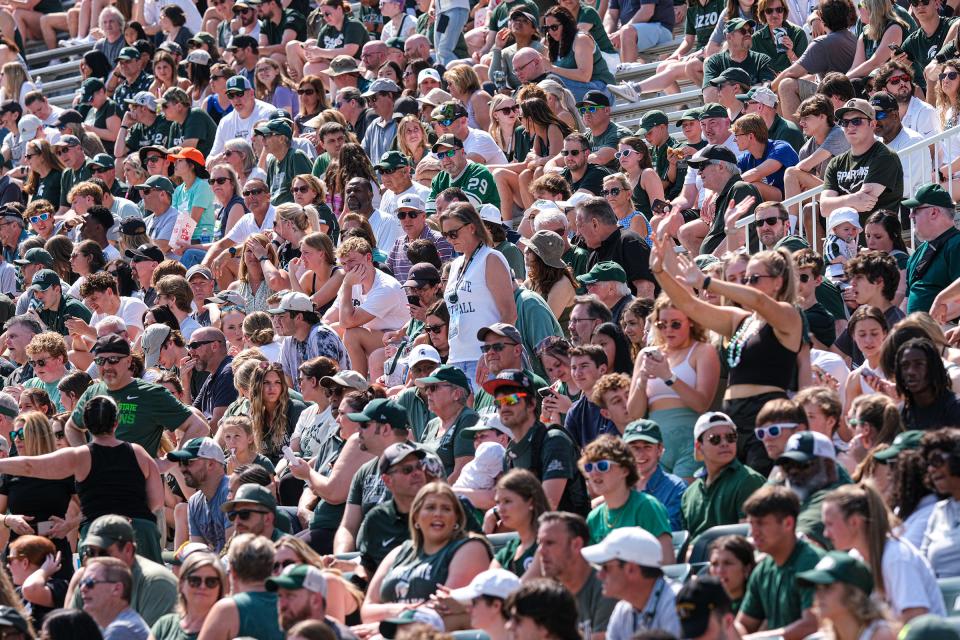Could alcohol be sold at Spartan Stadium this season? Here's what would need to happen

- Oops!Something went wrong.Please try again later.
EAST LANSING — As legislation that would allow universities to sell alcoholic beverages at events advances through the Michigan Legislature, Michigan State University sports fans may be wondering whether they will have the chance to buy a cold brew this fall.
The legislation working its way through the Legislature would allow a university to obtain licenses for its basketball, hockey and football stadiums, and arenas for athletic events and concerts. It could be passed and signed into law this summer.
The legislation appears to have bipartisan support, although some groups, including Mothers Against Drunk Driving, oppose it.
It’s unclear if legislators can jump the various hurdles in the short amount of time it would take to allow such a law to take effect in time for the Spartans' football opener against Central Michigan University in East Lansing on Sept. 1.
What would the bill do?
The bill would allow universities to sell alcohol at basketball, hockey and football stadiums for a maximum of 90 days per year, with up to 50 designated for basketball arenas, 25 for hockey arenas, 10 for football stadiums and five for special events like concerts. The sales must be conducted at fixed locations within the premises, meaning that roaming alcohol sales would not be allowed.
Alcohol sales would be allowed one hour before the event begins through the end of the event, while alcohol consumption would be allowed to take place until 30 minutes after an events' end.
What needs to happen in the Legislature?
While the bill only requires more than half of the legislators in each chamber of the Legislature to pass, it would require support from two-thirds of the House and Senate to take immediate effect upon Gov. Gretchen Whitmer's signature. That means 74 representatives and 26 senators need to support the measure.
Significant bipartisan support would be needed in both the House, where Democrats hold a 56-54 majority, and then Senate, where Democrats have a 20-18 edge. The bill has support from both sides of the aisle, with all 10 members of the Senate Regulatory Affairs Committee — six Democrats and four Republicans — voting to send the bill to the full Senate.
On Wednesday, the legislation cleared one hurdle, passing the full Senate 36-2. The bill will now be considered in a House committee, which will likely meet in the coming weeks.
Rep. Graham Filler, R-St. Johns, has introduced the bill's equivalent in the House, providing further indication that bipartisan support of the legislation is significant.
Without immediate effect, the bill would go into effect 90 days after the Legislature adjourns for the year, which would push its effective date into February or March 2024. Depending on the exact date of adjournment, the enactment date would miss all of the 2023 football season, but hockey and basketball seasons might see some later dates covered under the new law.
The bill now has to be considered by the Senate, followed by a House committee and the full House. The process could take several weeks as lawmakers prioritize state budget work. It's also contingent on Whitmer's eventual decision whether or not to sign the bill.
While Whitmer was previously leery about alcohol sales at college stadiums, she told FOX 2 earlier this year that she would support the bill if it passes.
While the bill has received bipartisan support inside the Legislature, some anti-alcohol groups have shared their opposition to the policy. Becky Iannotta, a spokesperson for Mothers Against Drunk Driving, told the Detroit News in 2022 that her organization disapproves of the proposal.
“Because many college students are under age 21, MADD recommends against selling or serving alcoholic beverages at any college athletic or sporting event,” she said. “MADD encourages all colleges to have policies in place that ensure alcohol is not sold to, marketed to, provided to or possessed by students under age 21 on their college campuses.”
What would MSU need to do?

Michigan State University Associate Athletic Director/Communications Matt Larson declined to comment Tuesday on whether the university would be ready to sell drinks should the bill go into effect before or during the 2023-24 school year.
Marlon Lynch, vice president and chief safety officer for Michigan State University, lobbied Senators Tuesday to support the legislation.
Lynch noted that MSU is one of three current Big Ten universities that don’t allow alcohol sales. The other two are the University of Nebraska and “the school down the road” (the University of Michigan). The NCAA began allowing alcohol sales in athletic venues in the 2018-19 season and Lynch said he’s seen positive findings from schools that have implemented sales.
Lynch said other Big Ten universities with in-stadium alcohol sales have not seen increases in alcohol-related incidents nor the need for increased police staffing. He attributed that to a decrease in binge-drinking before games, since adult attendees know alcohol will be available in the stadium.
MSU Athletic Director Allen Haller has publicly shared his support for the bill in the past, a break from his predecessor Bill Beekman.
"I've done a little homework, both nationally and within the Big Ten, and what I'm trying to do is increase the enjoyment factor for the fans who come to our events," Haller said in June 2022. "There are a portion of those who would like to have a beer or whatever at the event. I'd like to look into being able to provide that, just like there are some fans who want other things, whether it's different food items, better restrooms, larger concourses.”
If the bill is enacted into law, any sales plan would need to be approved by the MSU Board of Trustees before the university would allow the sale of alcohol in its facilities. The Board is slated to meet Friday, but then not again until Sept. 8, meaning an additional meeting would need to be called for the university to vend alcohol Sept. 1.
Primary sponsor of the bill, Sen. Sean McCann, D-Kalamazoo, pointed out during a Senate committee session that Spartan Stadium attendees in suites — often donors and those with university connections — already have access to alcohol. MSU can sell alcohol in Spartan Stadium suites because suites aren't connected to Spartan Stadium.
“My bill would expand the opportunity to have a beverage to all attendees to consume while enjoying the event,” he said.
Contact Sheldon Krause at skrause@lsj.com. Follow him on Twitter @sheldonjkrause.
This article originally appeared on Lansing State Journal: Could Spartan Stadium sell alcohol this season? What we know

